英语口语18大语音音变现象例句
详细英语发音规则句子读法

英语发音1.语音弱化(schwa)Eg.a peace of cakeC a n y ou give it t o me?I had a n apple f o r lunch t o day.2.语音同化(t and p)Eg.A whi(te) peace of paperLots of grea(t) parks in LondonI ha(te) potatoes.3.语音同化(t and k)Eg.Credi(t) cardGe(t) coldDo i(t) quicklyTha(t) cake4.特殊连读(带R)(不是很强烈,捎带)解释:当上一词尾音为[ɔ:] ,下一次首音为[ə:时加R Eg.Law (r)and orderDraw (r)a pictureMy dog hurt its paw (r)on some broken glass.There was a flaw (r)in the argument.I saw (r)a good film last night.5.语音弱化(and变/ən/或/ə/)Eg.Fish and chipsThinking and thinkingGoing to go and get the shopping6.省音(elision of ‘t’)当’t’在两个辅音之间时,要省掉’t‘的发音Eg.I ca n’t do it.I ca n’t stand the rain.It mus t be time to leave.The firs t person hereI don’t want it.7.语音连读当一个单词以[d] 结尾,另一个单词以开头[j],则要结合成为[də(着]Eg.Would you →wouldyou even would yaI’m sa d y ou decided to quit.I don’t think the gol d y ou bought was real.8.语音弱化(have to→haft)9.语音连读(w)当一个单词的尾音是/u:/ ,下一个单词以原因开头则带一点稍稍的w(无)音。
英语中的一些变音现象及读音规则
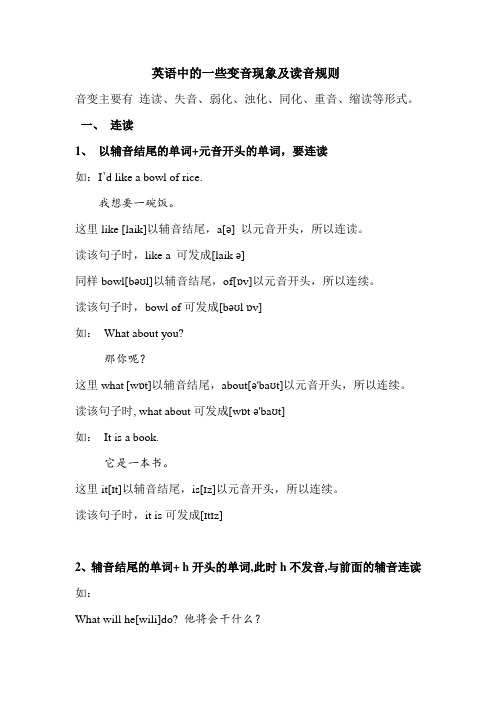
英语中的一些变音现象及读音规则音变主要有连读、失音、弱化、浊化、同化、重音、缩读等形式。
一、连读1、以辅音结尾的单词+元音开头的单词,要连读如:I’d like a bowl of rice.我想要一碗饭。
这里like [laik]以辅音结尾,a[ə] 以元音开头,所以连读。
读该句子时,like a 可发成[laik ə]同样bowl[bəʊl]以辅音结尾,of[ɒv]以元音开头,所以连续。
读该句子时,bowl of可发成[bəʊl ɒv]如:What about you?那你呢?这里what[wɒt]以辅音结尾,about[ə'baʊt]以元音开头,所以连续。
读该句子时, what about可发成[wɒt ə'baʊt]如:It is a book.它是一本书。
这里it[ɪt]以辅音结尾,is[ɪz]以元音开头,所以连续。
读该句子时,it is可发成[ɪtɪz]2、辅音结尾的单词+ h开头的单词,此时h不发音,与前面的辅音连读如:What will he[wili]do? 他将会干什么?Has he [hæzi]done it before?他之前做过这个吗?Must he [mʌsti] go?他一定要走吗?Can he [kæni] do it?他可以做吗?Should he[ʃədi]….?他应该…?Tell him to ask her[ɑːskɜː]….告诉他去叫她Leave him[liːvim].离开他For him [fɔ: im].对他而言3、“辅音+半元音”型连读英语语音中的/j/和/w/是半元音,如果前一个词是以辅音结尾,后一个词是以半元音,特别是/j/开头,此时也要连读。
如:Thank [θæŋk] you[juː] ,可读成[θæŋk juː].have [hæv]you[juː] ,可读成[hæv ju:]4、“r/re+元音”型连读如果前一个词是以-r或者-re结尾,后一个词是以元音开头,这时的r 或re不但要发/r/,而且还要与后面的元音拼起来连读。
英语的25个音变规则
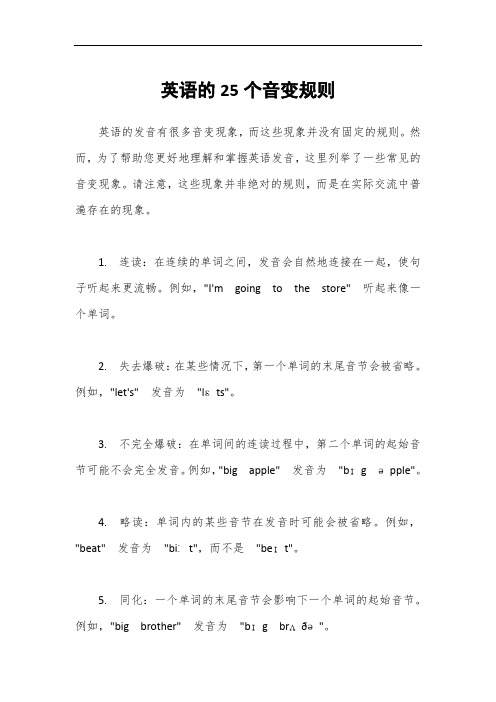
英语的25个音变规则英语的发音有很多音变现象,而这些现象并没有固定的规则。
然而,为了帮助您更好地理解和掌握英语发音,这里列举了一些常见的音变现象。
请注意,这些现象并非绝对的规则,而是在实际交流中普遍存在的现象。
1. 连读:在连续的单词之间,发音会自然地连接在一起,使句子听起来更流畅。
例如,"I'm going to the store" 听起来像一个单词。
2. 失去爆破:在某些情况下,第一个单词的末尾音节会被省略。
例如,"let's" 发音为"lɛts"。
3. 不完全爆破:在单词间的连读过程中,第二个单词的起始音节可能不会完全发音。
例如,"big apple" 发音为"bɪg əpple"。
4. 略读:单词内的某些音节在发音时可能会被省略。
例如,"beat" 发音为"biːt",而不是"beɪt"。
5. 同化:一个单词的末尾音节会影响下一个单词的起始音节。
例如,"big brother" 发音为"bɪg brʌðə"。
6. 弱读:在某些情况下,单词中的某些音节在发音时会变得较弱。
例如,"of" 在"a lot of" 中发音为"əv"。
7. 浊化:在某些情况下,清辅音在浊化环境下会变成浊辅音。
例如,"dog" 发音为"dɔg"。
8. 异化:单词的发音可能会受到周围单词的影响而发生变化。
例如,"fish" 在"fish and chips" 中发音为"fɪʃ"。
9. 音位替换:在某些情况下,单词中的一个音位会被另一个音位替换。
英语口语18大语音音变现象例句
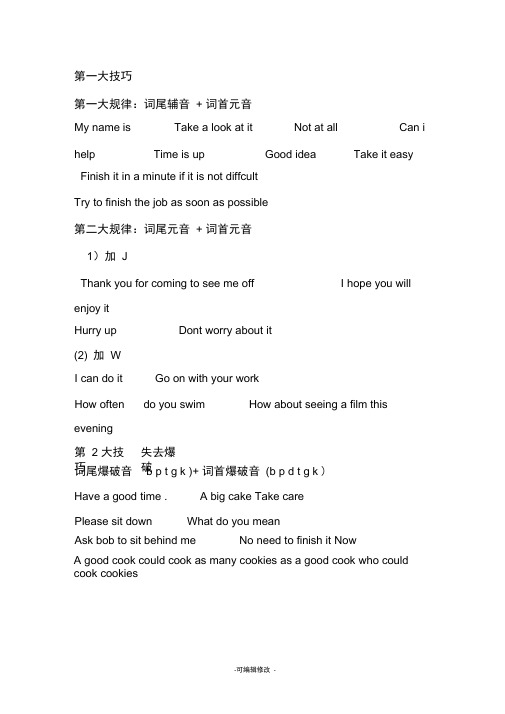
第一大技巧第一大规律:词尾辅音 + 词首元音Finish it in a minute if it is not diffcult Try to finish the job as soon as possible第二大规律:词尾元音 + 词首元音1)加 JThank you for coming to see me off enjoy it(2) 加 Weveningb p t g k )+ 词首爆破音 (b p d t g k )Ask bob to sit behind meNo need to finish it NowA good cook could cook as many cookies as a good cook who could cook cookies第 2 大技巧 失去爆破 Have a good time . A big cake Take care Please sit downWhat do you meanMy name is Take a look at it Not at all Can ihelpTime is upGood ideaTake it easyI hope you willHurry upDont worry about itI can do it Go on with your work How oftendo you swimHow about seeing a film this词尾爆破音第三大技巧 ;不完全爆破第一大规律:词尾摩擦音 + 摩擦音 ps 注意停顿,每句都有waterWhats the matter with you第二大规律:元音 +t+LI have a little problem第三大规律:连读后的浊化Not at all Say it again第 5 大技巧 第一大规律:相互同化 ( 1)t+j ——打不出来了Nice to meet youI know a lot about youI know you can speak good englishI think soI need some more moneyWhat would you advise me to do You must pay inadvance第二大规律:词尾爆破音 + 爆破音That jokeYou shouldnt treat women like objectCan i take a picture with you ?第四大技巧 浊化第一大规律:原音 +清辅音+ 元音 City letter water pretty citizen The sooner ,the better I think youd better see a doctorYour story just doesn 't holdStay out of this matterIll think about it Can i have a look at itTake care that you dont spoil your new clothes How about you(2)d+j-- 打不出Could you tell me where the bus stop isDid you finish your homework yesterdayWould you show me the bathroom(3)s+j-- 打不出来God bless you Baby i miss you everydayNow look what a mess you have done(4)z+j-- 打不出来How is your boyfriend Hows your family第二大规律:顺向同化(1)名词变复数:i want to buy a lot of english books(2)动词变第三人称单数:she works in zaidong education (3)动词变过去式或过去分词;she looked very blue yesterday (4)T+s :all of the students stop reading(5)D+s:my friends in america send me a message that the economic forecast is pleasant there第三大规律:逆向同化(1)before i eat dinner , i read the newspaper for a while(2)He is not the man he used to be3 )Dont worry , you get used to it in no time4 )You have to get off here5 )That is all he has to do6 )I had to go and talk with jim第六大技巧异化 ( 1)sp+ 元音:how do you spend your leisure timeAction speak louder than words (1)sk+ 元音:im so scaredIf i were a millionaire i would start a school(3) st+ 元音if you are ready,you may start your workWould you like some steak?(4) str+ 元音:the work is still strange to himHe struck me with a stick第七大技巧缩读看过美语歌词或美语电影的同学。
英语语音现象
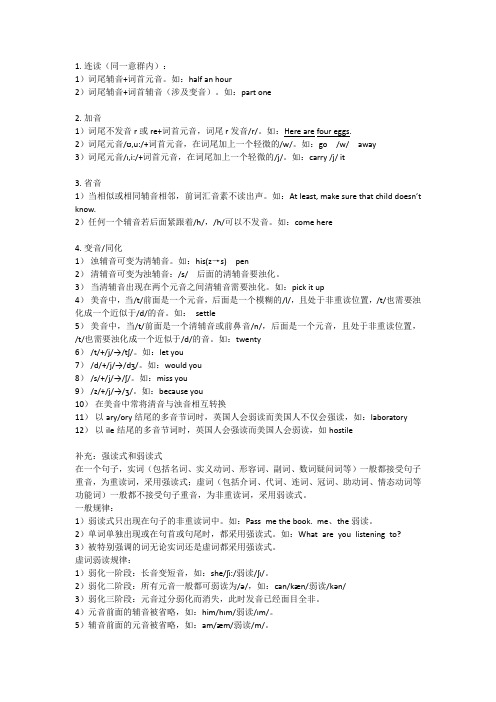
1.连读(同一意群内):1)词尾辅音+词首元音。
如:half an hour2)词尾辅音+词首辅音(涉及变音)。
如:part one2.加音1)词尾不发音r或re+词首元音,词尾r发音/r/。
如:Here are four eggs.2)词尾元音/ʊ,u:/+词首元音,在词尾加上一个轻微的/w/。
如:go/w/away3)词尾元音/ɪ,i:/+词首元音,在词尾加上一个轻微的/j/。
如:carry /j/ it3.省音1)当相似或相同辅音相邻,前词汇音素不读出声。
如:At least, make sure that child doesn’t know.2)任何一个辅音若后面紧跟着/h/,/h/可以不发音。
如:come here4.变音/同化1)浊辅音可变为清辅音。
如:his(z→s)pen2)清辅音可变为浊辅音:/s/后面的清辅音要浊化。
3)当清辅音出现在两个元音之间清辅音需要浊化。
如:pick it up4)美音中,当/t/前面是一个元音,后面是一个模糊的/l/,且处于非重读位置,/t/也需要浊化成一个近似于/d/的音。
如:settle5)美音中,当/t/前面是一个清辅音或前鼻音/n/,后面是一个元音,且处于非重读位置,/t/也需要浊化成一个近似于/d/的音。
如:twenty6)/t/+/j/→/tʃ/。
如:let you7)/d/+/j/→/dʒ/。
如:would you8)/s/+/j/→/ʃ/。
如:miss you9)/z/+/j/→/ʒ/。
如:because you10)在美音中常将清音与浊音相互转换11)以ary/ory结尾的多音节词时,英国人会弱读而美国人不仅会强读,如:laboratory 12)以ile结尾的多音节词时,英国人会强读而美国人会弱读,如hostile补充:强读式和弱读式在一个句子,实词(包括名词、实义动词、形容词、副词、数词疑问词等)一般都接受句子重音,为重读词,采用强读式;虚词(包括介词、代词、连词、冠词、助动词、情态动词等功能词)一般都不接受句子重音,为非重读词,采用弱读式。
英语音变规则总结举例
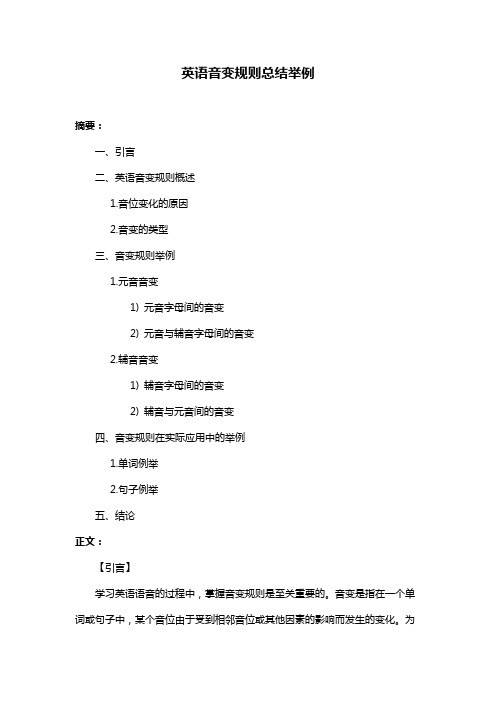
英语音变规则总结举例摘要:一、引言二、英语音变规则概述1.音位变化的原因2.音变的类型三、音变规则举例1.元音音变1) 元音字母间的音变2) 元音与辅音字母间的音变2.辅音音变1) 辅音字母间的音变2) 辅音与元音间的音变四、音变规则在实际应用中的举例1.单词例举2.句子例举五、结论正文:【引言】学习英语语音的过程中,掌握音变规则是至关重要的。
音变是指在一个单词或句子中,某个音位由于受到相邻音位或其他因素的影响而发生的变化。
为了帮助大家更好地理解和掌握这些规则,本文将详细介绍英语音变规则及其应用。
【英语音变规则概述】1.音位变化的原因音位变化主要受以下原因影响:1) 相邻音位的影响:当两个相邻的音位相互作用时,其中一个音位会发生音变以适应另一个音位。
2) 单词内部音节的压力:在一个单词中,音节之间的压力可能导致音位发生变化。
3) 发音器官的紧张程度:发音器官的紧张程度不同,可能导致音位发生变化。
2.音变的类型英语音变主要包括元音音变和辅音音变。
【音变规则举例】1.元音音变1) 元音字母间的音变:如“bed”中的[e]变为[],形成“begged”。
2) 元音与辅音字母间的音变:如“knight”中的[i:]变为[],形成“knighted”。
2.辅音音变1) 辅音字母间的音变:如“skate”中的[k]变为[g],形成“skated”。
2) 辅音与元音间的音变:如“boat”中的[c]变为[k],形成“boated”。
【音变规则在实际应用中的举例】1.单词例举- example:[ɡzmpl] → [gzmpl](元音音变)- tonight:[tnat] → [tnait](元音音变)- knight:[nat] → [natd](辅音音变)- skate:[sket] → [sketd](辅音音变)2.句子例举- She couldn"t believe her eyes.(她不敢相信自己的眼睛。
语音音变训练

语音音变训练第一大技巧---连读词尾辅音+词首元音1.My name is …2. I’m afraid…3. Take a look at it.4. Not at all.5. Can I help you?6. Time is up.7. Good idea. 8. Take it easy.9. Finish it in a minute if it is not difficult.10. Try to finish the job as soon as possible.词尾元音+词首元音当单词以aI、e、i、っI、I结尾+以元音开头的单词(加j连读)1. Thank you for see me of. (读时在of 前加j )2. I hope you will enjoy it.3. Hurry up!4. Don’t worry about it.当单词以au、o、u、v结尾+以元音开头的单词(加w连读)1. I can do it. 2. Go on with you work.3. How often do you swim?4. How about seeing a film this evening.第2大技巧---失去爆破词尾爆破音(b、p、d、t、g、k)+词首爆破音(b、p、d、t、g、k)1. Have a good time. 2. A big cake3. Take care.4. Please sit down.5. What do you mean?6. Ask Bob sit behind me7. No need to finish it now.8. A good cook could cook as many cookies as a good cook who could cook cookies.第3大技巧---不完全爆破词尾爆破音+摩擦音(f、v、s、z、h、∫、θ、З、)停顿一下1. I think so. 2. I need some more money.3. What would you advise me to do?4. You must pay in advance.词尾爆破音+破擦音(j 、w、t∫、dЗ、d r、t r、t s、d z)1. That joke.2. You shouldn’t treat women like objects.3. Can I take a picture with you?第4大技巧---浊化清辅音(p、t、k)浊化为浊辅音(b、d、g)元音+清辅音(p、t、k)+元音Ci t y le tt er wa t er pre tt y ci t izen 1. the sooner, the better. 2. I think you’d better see a doctor.3. You story just doesn’t hold water.4. What’s the matter with you?5. Stay out of this matter.元音+t +lI have a little problem.连读后的浊化I’ll think about it. Not at all.Can I have a look at it? Say it again.第5大技巧---同化相互同化:(1)t + j →t∫Nice to mee t y ou. I know a lot abou t y ou.I know tha t y ou can speak good English.Take care tha t y ou don’t spoil your new clothes. How abou t y ou? (2)d + j →dЗCould y ou tell me where the bus stop is?Di d y ou finish your homework yesterday?Woul d y ou show me the bathroom?(3) S + j →∫God ble ss y ou. Baby, I mi ss y ou everyday.Now look what a me ss y ou have done.(4)z + j →ЗHow i s y our boyfriend? How’s y our family?顺向同化:(1) 名词变复数:book s→s (清变清) bag s →z(浊变浊)I want to buy a lot of English book s.(2)名词变第三人称单数:She work s in Zaidong education.(3)动词变过去式或过去分词:ed\d→t(清) d(浊) Id(以t、d 结尾) She look ed very blue yesterday.(4) t + s→ts: All of the studen ts stop reading.(5)d + s →dz:My frien ds in American send me a message that the economic forecast is pleasant there.逆向同化Before I eat dinner, I read the new s paper for a while.He is not the man he us ed to be.Don’t worry, you get us ed to it in no time.You ha ve to get off here. That is all he ha s to do.I ha d to go and talk with Jim.第6大技巧---异化(1)sp+元音:How do you spend your leisure time?Actions speak louder than words.(2)s k+元音:I’m so scared.If I were a millionaire, I would start a school.(3)s t+元音:If you are ready, you may start your work.Would you like some steak?(4)str+元音:The work is still strange to him.He struck me with a stick.第7大技巧---缩读Want to→manna What do you manna do ?Be going to→be gonna I’m gonna study abroad.Have got to →gotta I gotta see you.Because→’cause I broke up with myboyfriend ’cause I don’t like him.Give me→gimme Gimme that book.Out of→outta Get outta here.you→ya How are ya?Are you→ya Where are you going?and →’n You ’n me. Rock ’n roll. What is the→what’sa What’sa matter?old →ol’look at that ol’man.sure→sher Are you sher?goodbye →g’bye I’m leaving, g’bye.What are you →wachya Wachya doing here?Ing →in’We are talkin’ about the education in China. Let me→lemme Lemme give you a n e xample.第8大技巧---略读词尾爆破音(b、p、d、t、g、k)Very good. I’m a student. Never give up.意群结尾的爆破音I could\ ’cause I believe I could.Mike likes to write\ by the nice bright ligh t a t night.I think \you shouldn’t pu sh him too hard.第9大技巧---被击穿的h音(1)him →’im (2)her→’erDon’t tell ’im. Please tell ’er.歌曲(Hey Jude)第10大技巧---弱读把元音弱化为\\Ladies and gentlemen. I have an English teacher. You and me. I’ll be back in half an hour. My wife and I are very happy.弱化为同类音长音→短音Me ---give me a sec to change film.We ---why don’t we go out for a while?She----she has an accent.弱到不发音:difficult、intention、information第11大技巧---鼻腔爆破(爆破音+n)爆破音不发Good night. Let me help you. I’m a student. Good morning. Her goodness was apparent to everyone. 第12大技巧--- 舌边爆破I have been very busy la te ly. Where have you been la te ly?I me t the old lady in the shop. He slept ba d ly.His foot was ba d ly hurt.第13大技巧--- 同类音的消失(s ---θs--∫z--z—З--З)What doe s th e man mean? This shop i s s o romantic.How wa s th e party last night? These clo thes are so beautiful.第14大技巧--- t音的消失(杀手音n)即可将t去掉Internet----I enjoy surfing on the internet.Twenty-----I take twenty thousand dollars with me. International--- Be an international Chinese.第15大技巧--- r音的连读Fo r e xample. My friend comes fro m a country fo r a way.I will keep my promise fo re ver. The re i s ten minutes left.The re a re over 600,000 kind s o f insects in the world.第16大技巧--- 辅音连缀重读后面那个音S+ m— He’s a smart businessman.S+ n----His shirt is as white as snow.S+ l---- Did you sleep well.S+ w----No sweet without sweat.P+ l----What’s your plan for the future.P+ r----The price of that house is high.G+ l----I am very glad that you could come.S+ p+ r----the rumor quickly spread through.S+ t+ r----He was a strict father.第17大技巧--- 情态动词完成时和过去将来完成时的不规则缩读Could have→could’ a Tom could’ a finish his homework. Must have→must’ a I must’ a very strange experience. Should have→should’ a I should’ a done it.Would have →would’a They would’a come to the meeting if he had know n a bou t i t.第18大技巧--- of不规则的缩读Kind of→kinda That is kinda battle in the war.A lot of→a lotta This week we are getting a lottabrand new information.Lots of→lotsa They all contain lotsa water.Sort of→sorta I sorta like’m.Bunch of→buncha The intent is for a buncha lawyers to make money. Because of→becausa It’s because that theoretical possibility that some people think it may be better to change.见词读音开音节:以元音结尾闭音节:以辅音结尾(map)(like)((bus、cut) 先确定单音节、双音节、多音节¤单词的重读:单音节的在第一个,双音节的在第一个,多音节的在倒数第三个⊙双音节单词发音:1.在两个音节的分界线上如果只有一(slogan,student,open,focus)2.在音节的分界线上如果有两个辅音字母,则分别划分到接弱读。
英语音标18大变音规则
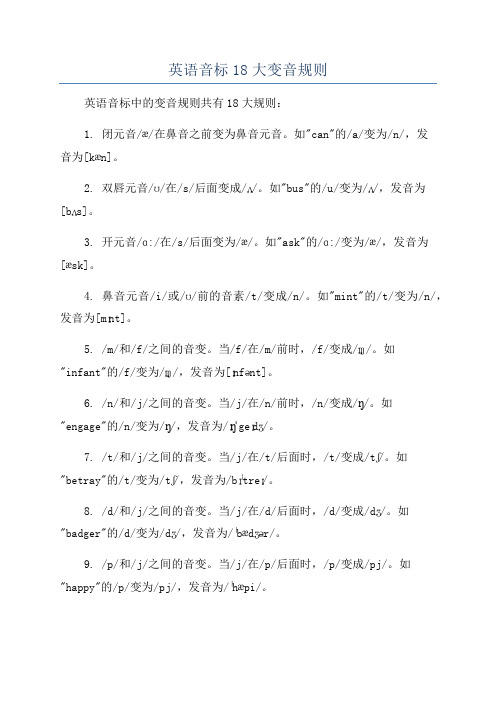
英语音标18大变音规则英语音标中的变音规则共有18大规则:1. 闭元音/æ/在鼻音之前变为鼻音元音。
如"can"的/a/变为/n/,发音为[kæn]。
2. 双唇元音/ʊ/在/s/后面变成/ʌ/。
如"bus"的/u/变为/ʌ/,发音为[bʌs]。
3. 开元音/ɑ:/在/s/后面变为/æ/。
如"ask"的/ɑ:/变为/æ/,发音为[æsk]。
4. 鼻音元音/i/或/ʊ/前的音素/t/变成/n/。
如"mint"的/t/变为/n/,发音为[mɪnt]。
5. /m/和/f/之间的音变。
当/f/在/m/前时,/f/变成/ɱ/。
如"infant"的/f/变为/ɱ/,发音为[ɪnfənt]。
6. /n/和/j/之间的音变。
当/j/在/n/前时,/n/变成/ŋ/。
如"engage"的/n/变为/ŋ/,发音为/ɪŋˈgeɪdʒ/。
7. /t/和/j/之间的音变。
当/j/在/t/后面时,/t/变成/tʃ/。
如"betray"的/t/变为/tʃ/,发音为/bɪˈtreɪ/。
8. /d/和/j/之间的音变。
当/j/在/d/后面时,/d/变成/dʒ/。
如"badger"的/d/变为/dʒ/,发音为/ˈbædʒər/。
9. /p/和/j/之间的音变。
当/j/在/p/后面时,/p/变成/pj/。
如"happy"的/p/变为/pj/,发音为/ˈhæpi/。
10. /g/和/j/之间的音变。
当/j/在/g/后面时,/g/变成/dʒ/。
如"digest"的/g/变为/dʒ/,发音为/daɪˈdʒest/。
11. /k/和/j/之间的音变。
当/j/在/k/后面时,/k/变成/tʃ/。
- 1、下载文档前请自行甄别文档内容的完整性,平台不提供额外的编辑、内容补充、找答案等附加服务。
- 2、"仅部分预览"的文档,不可在线预览部分如存在完整性等问题,可反馈申请退款(可完整预览的文档不适用该条件!)。
- 3、如文档侵犯您的权益,请联系客服反馈,我们会尽快为您处理(人工客服工作时间:9:00-18:30)。
第一大技巧第一大规律:词尾辅音+词首元音My name is .....Take a look at it.....Not at allCan i helpTime is upGood ideaTake it easyFinish it in a minute if it is not diffcult Try to finish the job as soon as possible第二大规律:词尾元音+词首元音(1)加JThank you for coming to see me off I hope you will enjoy itHurry upDont worry about it(2)加WI can do itGo on with your workHow often do you swimHow about seeing a film this evening第2大技巧失去爆破词尾爆破音(b p t g k )+词首爆破音(b p d t g k )Have a good time .A big cakeTake carePlease sit downWhat do you meanAsk bob to sit behind meNo need to finish it NowA good cook could cook as many cookies as a good cook who could cook cookies第三大技巧;不完全爆破第一大规律:词尾摩擦音+摩擦音ps注意停顿,每句都有I think soI need some more moneyWhat would you advise me to doYou must pay in advance第二大规律:词尾爆破音+爆破音That jokeYou shouldnt treat women like object Can i take a picture with you ?第四大技巧——————浊化第一大规律:原音+清辅音+元音City letter water pretty citizenThe sooner,the betterI think youd better see a doctor Your story just dosent hold water Whats the matter with youStay out of this matter第二大规律:元音+t+LI have a little problem第三大规律:连读后的浊化Ill think about itCan i have a look at itNot at allSay it again第5大技巧第一大规律:相互同化(1)t+j——打不出来了Nice to meet youI know a lot about youI know you can speak good englishTake care that you dont spoil your new clothes How about you(2)d+j--打不出Could you tell me where the bus stop isDid you finish your homework yesterday Would you show me the bathroom(3)s+j--打不出来God bless youBaby i miss you everydayNow look what a mess you have done(4)z+j--打不出来How is your boyfriendHows your family第二大规律:顺向同化(1)名词变复数:i want to buy a lot of english books(2)动词变第三人称单数:she works in zaidong education(3)动词变过去式或过去分词;she looked very blue yesterday(4)T+s :all of the students stop reading(5)D+s:my friends in america send me a message that the economic forecast is pleasant there第三大规律:逆向同化(1)before i eat dinner , i read the newspaper for a while(2)He is not the man he used to be(3)Dont worry , you get used to it in no time(4)You have to get off here(5)That is all he has to do(6)I had to go and talk with jim第六大技巧异化(1)sp+元音:how do you spend your leisure timeAction speak louder than words(1)sk+元音:im so scaredIf i were a millionaire i would start a school(3)st+元音if you are ready,you may start your workWould you like some steak?(4)str+元音:the work is still strange to himHe struck me with a stick第七大技巧缩读看过美语歌词或美语电影的同学。
(1)want to ----wanna what do you wanna do(2) Be going to -----be gonna im gonna study abroad(3)Have got to --gotta i gotta see you(4)Because ----cause i broke up with my boyfriend cause i dont like him(5)Give me ----gimme gimme that book(6)Out of -----outta get outta here(7)You ---ya how are ya(8)Are you -- where are you going(9)And ---n youn me rockn roll(10)What is the ---whatsa whatsa matter(11)Old ---ol look at that olman(12)Sure--sher are you sher(13)Goodbye----gbye im leaving gbye(14)What are you wachya/wacha wachya doing here(15)Ing---in we are talikin about the education in china(16)Let me --lemme lemme give you an example第八大技巧略读第一大规律:词尾的爆破Very goodIm a studentNever give up第二大规律:意群结尾的爆破音I could cause i believe i couldMike likes to write by the nice bright light at nightI think you shouldnt push him too hard第9大技巧被击穿的H音(1)him--im dont tell im(2)Her--er please call er实例操作Hey jude ,孙燕姿的hey jude。
自己去听第十大技巧--弱读弱毒三大规律:把元音弱化为打不出来Ladies and gentlemenYou and meI have an english teacherI’ll be back in half an hourMy wife and i are very happy第二大规律:弱化为同类音长音---短音Me give me a sec to change filmWe why don’t we go out for a walkShe she has an accent第三大规律:弱到不发音DifficultIntentionInformation第十一大技巧---鼻腔爆破Good nightGood morningLet me help youHer goodness was apparent to everyone I’m a student第十二大技巧--舌边爆破I have been very busy latelyWhere have you been latelyI met the old lady in the shopHe slept badlyHis foot was badly hurt第十三大技巧-----同类音消失What does the man meanThis shop is so romanticHow was the party last nightThese clothes are so beautiful第十四大技巧---t音的消失(杀手音n)Internet i enjoy surfing on the internet Twenty i take 20 thousand dollars with me International be an International chinese第十五大技巧---r音的连读、For exampleMy friend comes from a country far awayI will keep my promise foreverThere is ten minutes leftThere are over 600,000 kinds of insects in the world第十六大技巧--辅音连缀S+m he’s a smart businessmanS+n his shirt is as white as snowS+l did you sleep wellS+w no sweet without sweatP+l what’s your plan for the futureP+r the price of that house is highG+l i am very glad that you could comeS+p+r the rumor quickly spread throughS+t+r he was a strict farther第十七大技巧---情态动词完成时过去将来时缩写Could have ----could’a tom could’a finished homeworkMust have------must’a i must’a very strange experienceShould have ----should’a i should have done itWould have -----would’a they would’a come to the meeting if he had known about it第18大发音技巧----of不规则缩读Kind of ---kinda that is one kind battle in this warA lot of ---a lotta this week we are getting a lotta brand new information Lots of --lotsa they all contain lotsa waterSort of----sorta i sorta like’mBunch of ----buncha the intent is for a buncha lawyers to make money Because of --becausea it’s because of that theoretical possibility that some people think it may be better to change。
